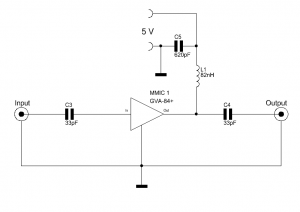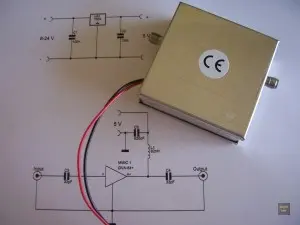Luckily the times when DIY projects in the GHz range have been the final frontier that’s rarely been crossed are over. Monolithic Microwave Integrated Circuits (short MMIC) are making the design of microwave (pre-)amplifiers a piece of cake. Mini-Circuits GVA-84+ is a perfect candidate for a simple 7 GHz preamplifier.
The datasheet [1] of the GVA-84+ indicates up to 24 dB gain and a very low noise figure (~ 6 dB). Up to about 4.5 GHz the maximum output power (1 dB compression point) is around 20 dBm (100 mW). That is enough for simple transmitting experiments in the GHz range. For just $ 1.82 per piece that is fairly incredible.
Creating a PCB layout is fairly simple. When working with such high frequencies it is really important to use prober PCB material. Commonly used FR4 material has an unacceptably fluctuating permeability. A fairly constant permeability is important though to design reliable strip-lines with a defined impedance. I used Rogers 4003 for my PCBs because I had a big piece available.
I do not want to get into specifics of PCB design for microwave applications now but I’d like to mention one ground rule. It is very important to have very short leads and strip-lines wherever possible. And please make sure that you have good grounding. What works on HF or VHF circuits might act crazy in the GHz range. The most common problem with grounding is the unintentional creation of tank circuits. What seems to be a perfect connection to ground at DC might be a perfect Lecher line in the GHz range.
Links and Sources:
[1] Mini-Circuits: www.minicircuits.com
Westerhold, S. (2012), "Broadband Preamplifier for up to 7 GHz". Baltic Lab High Frequency Projects Blog. ISSN (Online): 2751-8140., https://baltic-lab.com/2012/08/broadband-preamplifier-for-up-to-7-ghz/, (accessed: April 20, 2024).
Funding:
If you liked this content, please consider contributing. Any help is greatly appreciated.

